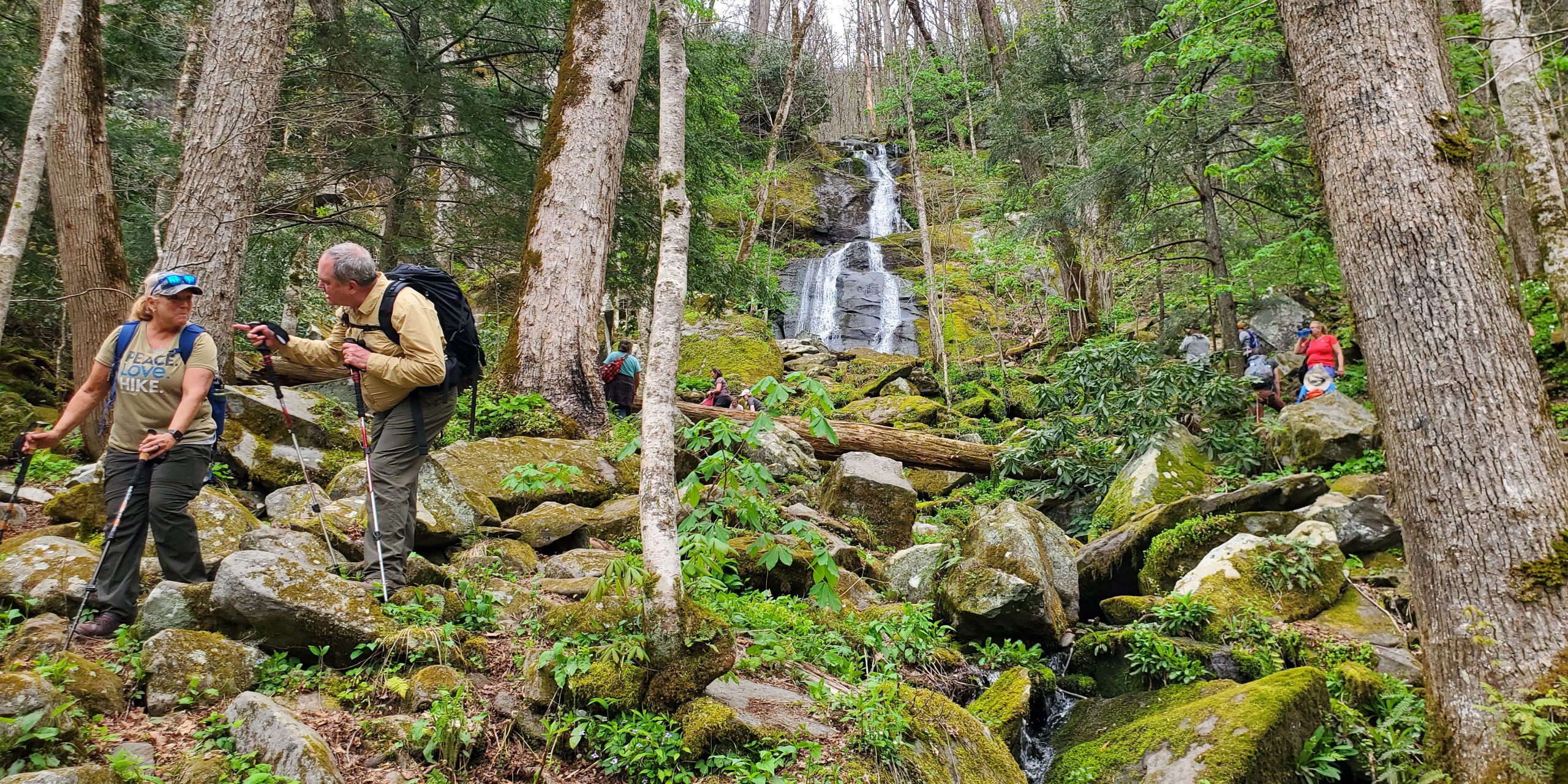
As the weather warms in Great Smoky Mountains National Park, the fragrant aroma of spring wildflowers fills the air. Northern cardinals sing in short bursts from the canopy, and robins flutter through the underbrush, calling out in search of a mate. Among the blooms, the distinct drone of insects joins the chorus as pollinators buzz from flower to flower, their bodies blanketed in a sticky yellow dust.
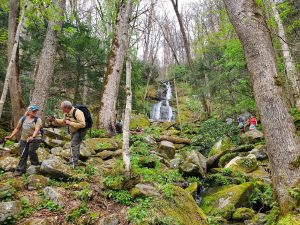
On a regular excursion, these sights and sounds might fade into the background—a pleasant yet peripheral attraction en route to a main-event destination with a view. But on a Great Smokies Eco-Adventure, it’s these discoveries along the way that take center stage.
Organized by Discover Life in America, a nonprofit partner of the national park, the annual Great Smokies Eco-Adventure fosters deeper connections with nature by leading participants on a guided, biodiversity-focused exploration of the Smoky Mountains. Adventurers seek, identify, and learn about species in their natural habitats—and some have even discovered species previously undocumented within the park.
“It’s the perfect event for us, because we not only get to talk to people about what we do, we get to show them,” said Todd Witcher, executive director of the Gatlinburg-based nonprofit, which aims to identify, catalog, and observe the park’s estimated 60,000-plus species through its flagship project, the All Taxa Biodiversity Inventory. Currently, less than half of that estimate has been officially identified by park scientists, creating opportunities for discovery on each and every outing.
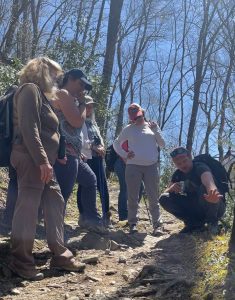
Now in its third year, the three-day, two-night Great Smokies Eco-Adventure experience doubles as a fundraiser for DLiA, funding vital research in the national park while inviting the general public to participate in the scientific process. Adventurers spend their days exploring the wilds of the Smokies on expert-led nature hikes and their evenings and nights glamorously camping, or “glamping,” at Camp Atagahi, a premier off-grid luxury camping facility owned and operated by partner organization A Walk in the Woods. This year’s Eco-Adventure, held Sunday, April 30, to Tuesday, May 2, will focus on spring wildflowers. Registration for the event closes Monday, April 10.
“It’s an experience you can’t get any other way,” said Pat DeRoos, a retired biology teacher who attended last year’s Eco-Adventure with her daughter and two granddaughters. “You can read about what this organization does all you want, but experiencing it is a whole different level—and on top of that, you just might discover something new. It’s all part of the adventure.”
On day two of last year’s event, a participant found and collected a tiny wasp, ichneumon devinctor. Though the species was already known to science, it was a completely new discovery within the boundary of Great Smoky Mountains National Park—bringing the park’s official count of known and identified species up to 21,346.
An avid hiker for most of her life, DeRoos explained that the Eco-Adventure was a completely new and different experience for her and her family—“for one, because of all the things we learned,” she said. “The hike wasn’t about ‘getting there,’ it was about what’s along the way. It slows you down, and you begin to notice things you wouldn’t have otherwise seen. You learn more about what’s out there, from [guides] who are fantastic storytellers.”
As a former teacher, DeRoos said she is well aware that good stories are key in creating lasting memories for children—but that’s also true for adults. In fact, during her days as an educator, DeRoos imparted that very lesson to one of her young student teachers: DLiA Executive Director Todd Witcher, with whom she reconnected during last year’s event. “You learn more from a hands-on experience than you can from a book or a computer screen,” she explained, “whether you’re a novice, an expert, or in between. This is a good reminder that learning doesn’t stop when school ends. It goes on, but only if you want it to—only if you seek it out.”
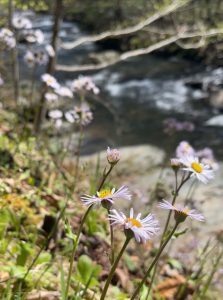
Though Great Smokies Eco-Adventures are tailored to groups of all ages and experience levels, DeRoos shared that perhaps her greatest joy was watching her granddaughters, Tinley and Torrey, respectively 17 and 11 years old at the time of the event, interact with nature in new ways.
“Suddenly they’re in their own tent—hearing the wind in the trees and the sounds at night, becoming much more in tune with the outdoors,” said DeRoos. “My youngest said she had never seen so many bugs in her life.” Though she was hesitant around insects at first, with a little encouragement from the guides, Torrey soon put her reservations aside. “Now she walks right up and stares at bugs,” said DeRoos. “She’ll send me pictures on her phone, asking, ‘What is this?’”
Their excitement only increased a week after the trip, when all participants were notified of the new species discovered on one of their hikes: “We were there on that hike and helped make that discovery,” DeRoos said. “I can’t tell you how rewarding that was for them, and we would never have discovered it if we had been just marching up to the top.”
While nightly accommodations for the Eco-Adventure are certainly in the wild and off-grid, they’re anything but primitive backcountry tent sites. At Camp Atagahi, spacious tents are mounted on wooden platforms and feature a covered front porch area. The campground includes a well-stocked kitchen and a pristine bathroom facility with running water, flush toilets, and hot showers. All meals, which are included in the ticket price, are prepared on-site with local produce and can be made to meet guests’ dietary restrictions. After a hearty meal and campfire, guests are lulled to sleep by the babbling creek that flows through the camp.
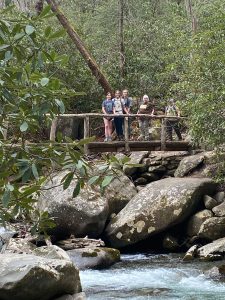
Between A Walk in the Woods staff taking care of campsite needs and DLiA leading the educational hikes, Witcher wants Eco-Adventurers to know that they are in good hands—whether they’re experienced backpackers looking for a fun guided experience or new to camping entirely.
“We always try to adjust the hikes based on the experience of the participants,” Witcher said. “We’ll adapt to whatever people are looking for—and we try to stay off the beaten path, in a way, to teach people about new spots in the park that may not be as crowded and busy.” The only prerequisite? Being “interested in what we do and wanting to learn more about the park.”
DeRoos added that it’s a great way to contribute to the organization and its work: “It’s more than just sending money in an envelope,” she said. “You’re offered an entire experience that allows you to see and feel what your donation was all about.”
For more information about the 2023 Great Smokies Eco-Adventure, held April 30 to May 2, or to reserve a spot at the event, visit dlia.org/event/eco-adventure-2023.
Subscribe to get the latest posts sent to your email.
The Great Smokies Welcome Center is located on U.S. 321 in Townsend, TN, 2 miles from the west entrance to Great Smoky Mountains National Park. Visitors can get information about things to see and do in and around the national park and shop from a wide selection of books, gifts, and other Smokies merchandise. Daily, weekly, and annual parking tags for the national park are also available.